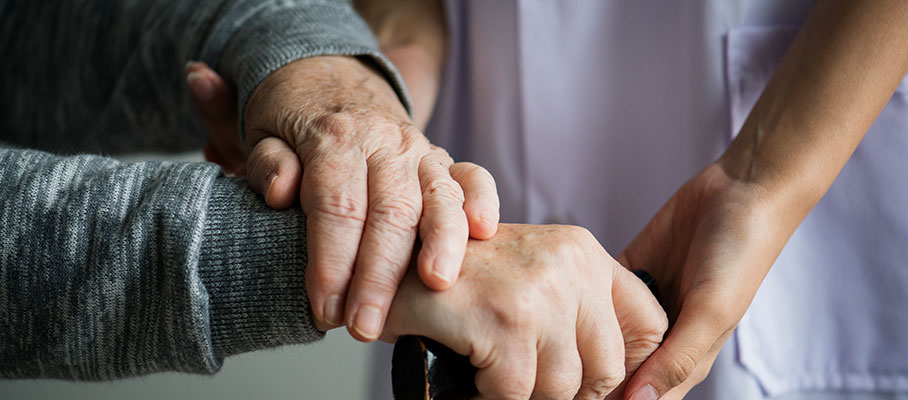Health checkup for senior citizens
When Do you Need to See a Doctor for Back Pain
Back pain is one of the most common health conditions that affects 8 out of 10 people at some point during their lives. Usually, the symptoms of back pain can be troublesome but short-lived and can last for some days. However, your back pain can be chronic if the symptoms have been bothering you for longer than 3 months. While younger adults face back pain majorly due to lifestyle-related causes, elderly people are at risk due to advancing age. It is pivotal to schedule regular health checkup for senior citizens. What may be giving you back pain? Strain in the muscles is one of the most common causes of back pain. Factors like incorrect lifting of heavy objects, improper posture, and sudden body movements can lead to muscle strain. While the discomfort from a typical muscle strain can last between three to six weeks, more severe muscle strains can take several weeks or a few months. Over activity after prolonged periods of inactivity (such as playing a sport once in a while) can also cause temporary stiffness and pain. Injured discs (tissue that cushion the spaces between each vertebra) is a leading cause of back pain. Spinal osteoarthritis that occurs due to damage of cartilages of joints in your lower back can lead to back pain. Thinning of the bone, called osteoporosis, can result in small fractures in your vertebrae which can cause pain. Vitamin D is an important nutrient that can help manage bone thinning. Though there is not enough data, various studies have shown that low levels of vitamin D can be a cause of increased joint and muscle pain. Women are at a higher risk of developing osteoporosis than men. Check out the vitamin D test price now and book within the comfort of your home. When to worry and see a doctor for my back pain? Do you keep ignoring back pain until it starts hampering daily routine activities? One primary reason for this is back pain can come and go. But, it may become chronic and be continuously present. You can benefit from taking over-the-counter pain relievers, anti-inflammatory drugs to reduce inflammation, and resting for 1-2 days. Compresses can help decrease pain and inflammation and work quite well for some people. However, certain symptoms alongside back pain may warrant an immediate action or the need to see a doctor. Seek medical attention if any of the following symptoms accompanies your back pain: Increasing weakness in your legs Loss of bladder and/or bowel control Sudden spike in pain, discomfort, weakness or numbness High fever Severe abdominal pain The pain results from a fall or severe blow to your back. Do I need tests for back pain? If the cause of your back pain is not very obvious, your treating doctor may advise: Blood work up Urine tests (to check for kidney related conditions that can give back pain at certain times) X-rays, CT, or MRI scans of the spine to assess your discs, muscles, ligaments, nerves, and blood vessels Bone scan to look for any aberrations in the bone tissue Here are 4 quick tips to keep back pain away 1. Safeguard your discs right after waking Maintain a straight back for an hour or two after waking in the morning. As per some studies, the pressure within your discs increases up to 240% when you sleep at night. At this time, your discs can be at a raised risk of herniation if made to bend or lift forces. 2. Choose your bag wisely Heavy laptop bags and purses can add unnecessary stress to your neck and back. Carry less (only what is really required) and use bags (backpacks) that have wide straps to distribute the weight more evenly. 3. Invest in an ergonomic office chair, if you are working from home Many of us may be actually working from bed while working from home. However, not having proper sitting posture and slouching forward during long work hours on laptops lead to excessive pressure on the back and can cause pain. Use a chair that helps you align and support your neck, back and thighs accurately. Take regular stretch breaks in between work. 4. Protect your back while lifting Common everyday activities, such as unloading heavy grocery bags or lifting a toddler can lead to lower back problems. Bend at your knees, not at your lower back and hold the object close to your chest while keeping your spine straight. Along with your back, keep an eye on your overall health as it may result in generalized body ache. Advancing age demands a little extra care. Do not ignore long-standing pain or worsening symptoms, especially in elderly. A full body checkup for senior citizens can be a good starting point to kick off the health journey.
Menopause calls for a pause: Look back and Set the Pace
Menopause is the time in a woman’s reproductive cycle which marks the end of her periods. It might seem like “a good thing” to many young women, especially those who have a painful menses, or find it to be a draining time period that just appears every month. However, menopause indicates that the woman’s body is going through various hormonal changes, and some of these changes may bring unpleasant experiences. It can really be a tough transition phase for many women.Women around us usually keep neglecting their health to take care of everyone else around them. Book a health checkup and be aware if they need any medical help. How to know if it is menopause or something else? Basically, it is the age combined with the change in menstrual cycle. It is diagnosed after consecutive 12 months have passed without a period. In general, the natural menopause occurs between 45 and 55 years of age. As per different studies, the range of mean age at menopause reported in Indian women appears to be rather young, between 41.9 and 49.4 years.* How do the menopause symptoms feel like? First and foremost, the changing levels of estrogen and progesterone, two important female hormones produced by the ovaries, causes symptoms to appear. Not all women experience all symptoms. They may include: Change in your period: Irregular periods Dryness in vagina Hot flashes Chills Night sweats Problems with falling asleep Mood changes or mood swings Weight gain and a slow metabolism Medical tests for menopauseAt large,menopause can be self-diagnosed. If you are not able to relate to the pattern, do consult a doctor. Also, there is no single lab test that can reliably predicts if a woman is going through menopause. However, a few blood tests may help your doctor understand your body. A simple blood test that checks your body’s levels of follicle-stimulating hormone (FSH) and estrogen can be asked for. During menopause, FSH levels rise and estrogen levels decline. Book FSH test here. Many times, hypothyroidism or low thyroid hormone levels can also mimic symptoms that are similar to menopause. Hence, an additional blood test to check on the thyroid function can be required.Book thyroid panel here 5 tips to deal with menopause symptoms 1. Acknowledge your mood changes and seek help The mood changes that come with menopause can get you crying or cranky. Understand that it is not unnatural to happen during this time. Some women may get even bigger mood swings than you. Take control of your mind with relaxation techniques and yoga. Do fun things with friends or family. If you think these measures are not helping, seek help from a medical expert. They may prescribe medicines including a low-dose birth control pill and antidepressants. 2. Learn and find ways to “tackle the hair problem” Around menopause, you can find your hair to thin or shed faster. At the same time, unwanted hair may grow on your chin and cheeks. Do not overdo hair care products. Avoid the sun, which is drying hair and can cause damage. For unwanted facial hair, take help of wax, bleach, pluck, or laser therapies. If you use hair color, choose coloring products that don't have harsh chemicals. 3. Revive sex driveIt is very common to have a reduced sex drive during menopause. This occurs due to decreased hormone levels that can cause vaginal dryness and tightness, resulting in pain during sex. Speak with your partner around the challenges you face. This is the time to downplay the focus on sex and set priority on making time to be together, along with foreplay, cuddles, massage, etc. Also, try keeping stress at bay as much as possible, as the mental pressure puts sex drive in park.4. Try helping yourselves down thereAround menopause, the vagina may get thinner and dryer. Consult a doctor and try water-based vaginal lubricants or vaginal moisturizer. Your expert can also give you prescription vaginal creams or rings, or pills to tackle these vaginal symptoms and painful sex. Also remember, sex can increase the blood flow down there, which keeps things healthy. 5. Keep a diary to track hot flashesIt iswise to know what sets off your hot flashes. It can be caffeine or alcohol, or just a hot room. If you feel a flash setting in, take slow, deep breaths, in your nose and out your mouth. For tough cases, speak with your doctor. What should you not do during menopause? Don’t assume your sex life is over: It is common for both women and men to have lower libido as they age. The sex hormones level may drop as we age, resulting in lower sex drive. You can try lubricants to tackle the pain that may ease the anxiety that comes with a previous painful experience. Also by this time, your relationship is above and beyond just sex. Don’t ignore mood changes: Menopause acts as a signal to your brains that your bodies are changing. Denying that fact can lead to some serious outcomes, including depression. Face the changes, do not feel helpless in the changing landscape, and let go of the irreversible ones. Don't blame menopause for your weight gain: Watch your diet and stay physically active. Preventing weight gain and obesity during your middle years is possible. Don't cut down on social support: You may feel disconnected at some times. However, some studies report that menopausal women who had better interactions with family and attended more monthly meetings, had better mental functioning. The takeaway is to accept your body. Stay strong and stay positive. Important links: Book your TSH test here Senior Citizen Health Checkup
Important medical tests that your elderly needs
Health tests for seniors Health tests for seniors Are you caring for an elderly at home? Confused about how to take care of them in a better way? And most importantly, do you think they don't need anything as they aren’t asking? Either you want to identify their unmet needs or you want to be on the top with taking their care, one thing which you must do is to take a proactive approach. This holds true for almost every aspect of life- it could be their day-to-day activities or occasional engagements. But more so, when it comes to the health needs. Your elderly might not reach out to you to get a health screening done or consult a doctor until something is upsetting repeatedly, grossly! But that shouldn’t be the case, right? What can you do here? We have a tip: Just anticipate their health needs, take initiatives, and do what you need to do even before something starts bothering them or they have to reach out to you. Looking for help to help your seniors stay healthier and happier? Then, read on to know what medical checkups or tests are required for older adults (you can thank us later!): Bone density check: The bones tend to lose essential minerals like calcium and phosphate in place of retaining them as aging occurs. This means bones, joints and muscles get weaker, which in turn affects your posture, strength, and movement. Schedule a bone density scan for your seniors to know about their bone health. Also, vitamin D helps your body absorb more calcium and also keeps your muscle movement intact. So, it is very important to check the body's vitamin D level and replenish it if required. Diabetes: The risk of getting diabetes increases with the advancing age. In most simple words, diabetes means having higher than normal sugar (glucose) levels in the blood. Do you know India is already home to 72 million diabetics?[1] This is a health threat that not only older adults but young people also need to be well-aware of. High sugar levels impact almost every vital body organ, including heart, kidneys, and brain. In fact. uncontrolled diabetes is a prime risk factor for heart disease. Make sure to get your elderly’s blood sugar tested every 3-6 months. If they have already been diagnosed with diabetes and taking medicines, keep monitoring their health status through a HbA1c test, at a frequency advised by the doctor. An HbA1c test measures average blood sugar for the past 2-3 months and gives directions on treatment and lifestyle changes. Blood pressure: You must have heard from your elderly that they get to know when they are having a high blood pressure (BP). However, the truth is high BP often does not show any symptoms, and that is why medical experts call it a silent killer. Do not wait for them to blame the high BP for that morning headache, get their BP checked during routine health checkup. You can do that with the help of a blood pressure monitor at home too. This is especially important if they are overweight, have diabetes, or any other heart-related condition. Cholesterol levels: Cholesterol is a fat-like substance produced by your liver naturally. Cholesterol is important for maintaining cell health in your body. But, having an excess of cholesterol can cause your blood vessels to clog and pose obstruction to free flow of blood. High cholesterol levels are considered a risk factor of heart attack and stroke. It is thus important to keep an eye on the blood cholesterol parameters and consult an expert if the reports ask so. PSA (Prostate specific antigen) test for elderly men: The PSA test is a screening test that checks for prostate cancer. As per age-specific studies, the risk of prostate cancer begins to rise sharply after age 55 years, peaks at 70-74 years, and slightly decreases thereafter.[2] Breast cancer and cervical cancer screening: Though breast cancer can affect young women, half of the newly diagnosed cases are seen in women who are over 60 years of age, and more than a fifth are over 70.[3] Also, risk of getting great cancer increases with age. Talking about the screening, a self-examination of breast and mammogram can help detect the disease at an early stage and take the right treatment on time. There is some ambiguity between the medical experts on how often most women need breast cancer screening. The American Cancer Society recommends annual mammograms beginning at age 45, then switching to once every 2 years at age 55 years. On the other side, the US. Preventive Services Task Force calls for screening every other year for ages 50 and above, and then no more after age 75. Women under 50 should consult their doctor about whether they require screening. Cervical cancer is a type of cancer that occurs in the lower part of the uterus that connects to the vagina (called cervix). There are two tests that help in cervical cancer screening- Pap test and HPV test. While the Pap smear test looks for cell changes on the cervix, the HPV test looks for the virus (human papillomavirus) that can cause cell changes. Path to a better senior health Along with scheduling the medical tests and routine health tests on time for your elderly loved ones, make sure to encourage them to eat healthy, avoid smoking, and stay physically active. And most important of all, spend time with them to let them feel cared for!
 Home Visit
Home Visit Upload
Upload

















 WhatsApp
WhatsApp